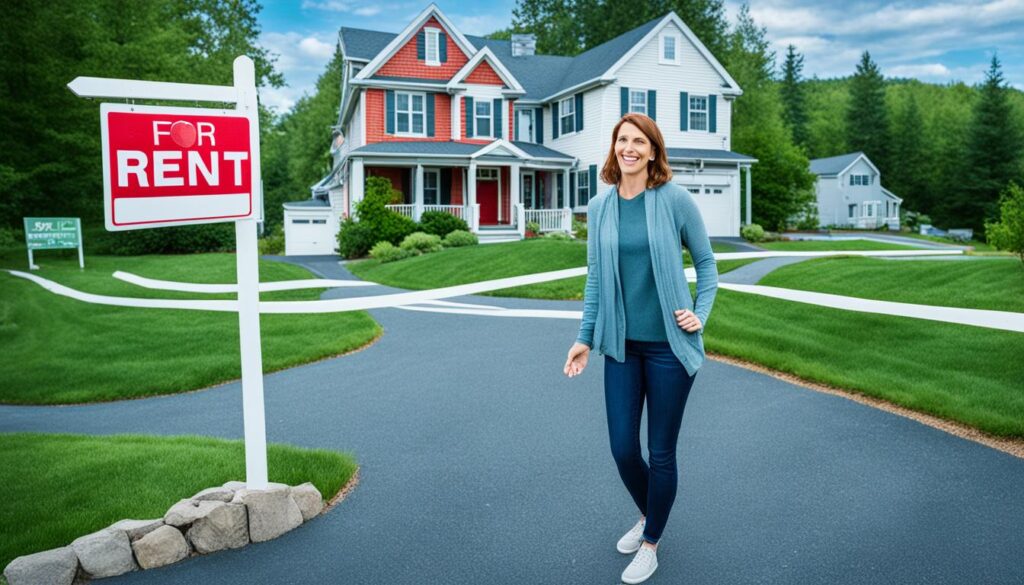Did you know that the median asking rent increased by a staggering $305 from June 2019 to June 2024? This considerable rise adds another layer of complexity to the age-old question: Should I buy a house or keep renting? Making the home buying decision is not just about your current financial situation; it impacts your lifestyle and long-term goals significantly. As homeownership continues to be a desirable option, the average sales price for a home in the United States hit $420,800 in early 2024, showing the ever-evolving nature of the housing market1
The choice between renting or buying a home is crucial, requiring careful evaluation of not just current costs, but potential financial returns over time. Remember, while renters can enjoy flexibility, they forego the opportunity to build equity in a property, something that homeowners can leverage as their real estate appreciates. Ultimately, understanding the implications of this decision will empower you to make a choice that aligns with your financial health, lifestyle ideals, and personal ambitions.
Key Takeaways
- The median rent increase reflects rising housing costs, making buyers consider their options.
- Homeownership typically involves additional expenses such as maintenance and insurance beyond just mortgage payments.
- Buying a house may initially be expensive, but long-term costs could be lower compared to renting.
- Renters do not build equity over time, while homeowners can benefit financially from property appreciation.
- Financial readiness, including a sufficient down payment and good credit, is crucial for homebuyers.
- Location can influence whether renting is more affordable than buying, especially in high-priced markets.
- Long-term stability and the possibility of equity growth are key benefits of homeownership.
Understanding the Home Buying Decision
The home buying decision is a pivotal moment that influences not just your finances but also your lifestyle and future plans. It’s crucial to weigh the pros and cons of renting vs buying, considering various factors that can impact long-term stability. For instance, while renting is often cheaper than purchasing a home in the short run, homeownership can lead to strong financial benefits over time.
Why It Matters to You
The choice between renting and buying significantly affects personal circumstances. Homeownership can provide increased financial stability, as owning a home typically allows for equity building over time, and homeowners incur some tax advantages, such as deducting property taxes and mortgage interest2. Rent might seem attractive due to lower upfront costs, but it often comes with increased rates over the years3. Mortgages that consume 25% or less of your income are generally considered manageable, underscoring the importance of assessing your financial readiness before making a decision2.
Market Conditions and Their Impact
Market conditions play an undeniable role in shaping the home buying decision. Variable rent rates can push potential buyers to delay purchasing a home until conditions are more favorable2. Current housing prices can make rentals seem more accessible, despite the possibility of higher rental costs compared to mortgage payments for similar properties2. Furthermore, fluctuations in interest rates significantly affect monthly payments, influencing overall affordability for future homeowners3.

| Factor | Renting | Buying |
|---|---|---|
| Initial Costs | Lower upfront costs; security deposits typically 1-2 months’ rent | Requires down payment (3%-20%), plus closing costs (2%-5% of loan) |
| Monthly Payments | Increasing rental rates over time | Fixed mortgage payments, excluding variable property taxes and insurance |
| Flexibility | More flexibility to move | Less flexibility; more commitment required |
| Ongoing Costs | Renters insurance ($15-$30/month); minimal maintenance costs | Home maintenance, repairs; potential for high insurance costs |
| Equity Growth | No equity building | Equity increases with home appreciation |
Factors to Consider When Choosing Between Renting and Buying
Deciding between renting and buying requires careful consideration of several factors. Understanding your financial readiness is crucial in this rent vs buy analysis. It involves evaluating your ability to handle upfront costs, ongoing expenses, and potential financial benefits associated with homeownership.
Financial Readiness
Purchasing a home entails a variety of costs, including down payments and closing costs, which can significantly impact your financial situation. It is essential to factor in regular expenses such as property taxes, maintenance, and potential interest payments. Mortgage interest can make up nearly all of your monthly payments in the early years, sometimes taking as long as 13 years before more of your payment goes toward the principal balance in a 30-year home loan. For instance, on a $100,000 loan at 4% for 30 years, you could spend about $72,000 in interest4. Understanding these aspects reinforces the question: is it better to rent or buy a house?
Personal Lifestyle and Future Plans
Your personal lifestyle and future plans also play a pivotal role in determining the right choice. Renting offers flexibility, enabling relocation without the long-term commitment of homeownership, which may be advantageous for those who expect changes in their job or family situation5. Conversely, homeowners can build equity—the difference between the property’s value and the remaining mortgage balance—making homeownership appealing for those looking to invest in their future.
Current Economic Climate
The current economic climate significantly influences your decision. Homeownership comes with market risks; values may rise or fall, leading to potential financial gains or losses. During challenging times, many have faced underwater mortgages, making it critical to examine the housing market before obtaining a mortgage4. Renters, while facing potential rent increases or sudden relocations due to a landlord’s decisions, do not incur additional responsibilities, such as property tax or maintenance costs, which can add financial stress for homeowners5.

| Factors | Renting | Buying |
|---|---|---|
| Financial Commitment | Lower upfront costs | Higher initial costs, e.g., down payments |
| Maintenance Duties | Landlord responsible | Homeowner responsible |
| Property Taxes | No obligation | Ongoing expense |
| Flexibility | High, easy to relocate | Low, long-term commitment |
| Equity Building | No equity | Builds over time |
Pros and Cons of Renting vs Buying
Choosing between renting and buying involves weighing the strengths and weaknesses of each option. The renting vs owning a home comparison helps clarify these aspects for potential renters and buyers.
The Flexibility of Renting
Renting offers remarkable flexibility, especially beneficial for those who may relocate frequently due to job changes or personal circumstances. Renters enjoy predictable monthly expenses without the burden of home maintenance and repairs, which can save vast amounts of time and money6. Renting is generally a short-term commitment, allowing for easy transitions once the lease period ends6. However, it often lacks the significant financial advantages attached to homeownership, as renters do not build equity in the property, meaning they miss out on the investment opportunities that come with buying6.
Advantages of Homeownership
Homeownership presents various advantages, including the ability to build equity, as monthly mortgage payments contribute to investment returns over time7. Homeowners often experience pride in ownership and greater freedom regarding renovations and property use6. Furthermore, tax benefits like the ability to deduct mortgage interest payments can lower overall financial liabilities6. Despite these benefits, homeownership involves substantial upfront costs and ongoing payments, including property taxes, insurance, and maintenance obligations7.
Potential Drawbacks of Each Option
Both renting and buying come with drawbacks. Renters can face sudden rent increases, potentially making it difficult to maintain long-term affordability6. Stability can be an issue, as landlords hold the authority to evict tenants, which may leave renters feeling vulnerable6. On the other hand, homeowners are subject to costs for maintenance and repairs, along with risks associated with fluctuations in property values, which can lead to financial strain8. A comprehensive understanding of these pros and cons enhances the renting vs owning a home comparison and contributes to making an informed choice.
The Cost Analysis: Rent vs Buy
When evaluating whether to choose renting or buying a home, a comprehensive cost analysis is essential to making an informed decision. The upfront and ongoing costs associated with purchasing a home are significant factors in the renting or buying a home guide. Typically, homebuyers are advised to prepare for a down payment of at least 20% to avoid private mortgage insurance, which can add substantial initial expenses9. Additionally, closing costs and maintenance expenses, estimated at around 0.5% of the home’s value annually, must be considered alongside property taxes and homeowner’s insurance in recurring costs that often exceed standard rental charges910,).
Upfront and Ongoing Costs
Understanding the particulars of upfront costs for purchasing real estate is crucial, as it sets the groundwork for future financial commitments. Renting typically presents a lower barrier to entry, allowing prospective tenants to invest their savings in diversified portfolios if it proves cheaper than homeownership910,). Long-term homeowners are encouraged to remain in their properties for at least three years to offset these initial expenses and benefit from potential appreciation in home value.
Understanding Equity and Home Value
A significant advantage of homeownership is the ability to build equity over time, as property values typically appreciate, leading to a potential return on investment. However, the housing market’s dynamics can influence individual property values, making it imperative to assess these trends when considering your rent vs buy analysis9. Moreover, calculating the price-to-rent ratio can offer valuable insights; a ratio greater than 20 suggests renting might be the better option, while a lower ratio favors buying. Ultimately, your decision should align with your commitment level, financial situation, and long-term plans.
FAQ
Should I buy a house or keep renting?
What are the main advantages of renting?
What are the key advantages of homeownership?
What are the drawbacks of renting?
What are the potential downsides of buying a house?
How can I assess my financial readiness to buy a home?
What impact do current market conditions have on decisions to rent or buy?
Is homeownership a better investment than renting?
How do I conduct a rent vs buy analysis?
Source Links
- https://fortune.com/recommends/mortgages/renting-vs-buying-a-home/
- https://www.ramseysolutions.com/real-estate/buy-vs-rent-myths-busted
- https://www.moneygeek.com/mortgage/resources/rent-vs-buy-guide/
- https://www.investopedia.com/articles/personal-finance/083115/renting-vs-owning-home-pros-and-cons.asp
- https://www.quickenloans.com/learn/renting-vs-buying-a-house
- https://www.firstalliancecu.com/blog/pros-and-cons-of-renting-and-buying-a-home
- https://www.chase.com/personal/mortgage/education/financing-a-home/renting-vs-buying-house
- https://www.bankrate.com/real-estate/renting-vs-buying-a-home/
- https://www.fidelity.com/viewpoints/personal-finance/rent-vs-buy
- https://www.nytimes.com/interactive/2024/upshot/buy-rent-calculator.html

